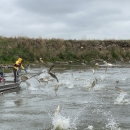Procambarus virginalis, marbled crayfish, was initially discovered in the aquarium trade in Germany in the 1990s but was thought to be a form of the North American P. fallax. In 2017, it was described as a full species for which no native range is known. In the 21st century, nonnative populations have become established in several European countries, Madagascar, Taiwan, and possibly Israel. P. virginalis reproduces via parthenogenesis, meaning a single individual can found a new population. Although popular in aquaria, several U.S. States are implementing bans on the possession and trade of P. virginalis. There are anecdotal reports of impacts of P. virginalis on fisheries, rice agriculture, and native amphibian and snail populations, but clear, convincing, and reliable documentation of these impacts is not yet available. For this reason, the History of Invasiveness for P. virginalis is classified as Data Deficient and the Certainty of Assessment is Low. The Overall Climate Match to the contiguous United States is High. Areas of high match were found primarily around the Great Lakes, the Appalachian Mountains, and the southern Rocky Mountains. The Overall Risk Assessment Category for P. virginalis in the contiguous United States is Uncertain.
Publication date
Type of document
Uncertain Risk
Program
Species



